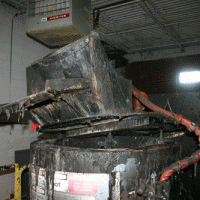Thermal oils, also called organic heat transfer fluids, are specialized industrial fluids that deliver energy from a central common fluid heater to different types of heat consuming equipment. Thermal oil systems are similar to hot water hydronic systems supplied by boilers; however, use of thermal oils allows systems to operate at higher temperatures without the higher pressurization required by water-based systems.
Use of Thermal Oils
In a hydronic system, water at 500°F must be pressurized to more than 665 psi to prevent boiling. This requires specialized piping systems and heavy-duty boiler construction to safely contain the high pressure. By contrast, many thermal oils have very high temperature boiling points that allow 500°F (and higher) operation in an essentially non-pressurized system. As a result, thermal oil systems can use lighter weight piping and fluid heater construction.
One downside of thermal oils is that they are combustible. Normally, thermal oils are used at temperatures well above their flash and fire points, sometimes approaching their autoignition temperatures. If a system leak occurs, a fire can easily result. Specific designs have been developed to allow these fluids to be safely used. In addition, the operation and maintenance of thermal oil systems must be carefully conducted per the requirements of both the heating system and oil supplier. When proper designs are not utilized or proper procedures are not followed, fires can be the result.
Thermal Oil Safety
When considering thermal oil related equipment, a number of resources can be consulted for guidance. Manufacturers of thermal oils typically have detailed application guides for their products that should be religiously followed.
A number of standards, guides, codes and books are also helpful including:
FM Global Data Sheet 7-99 Heat Transfer by Organic and Synthetic Fluids,
NFPA 664 – Standard for the Prevention of Fires and Explosions in Wood Processing and Woodworking Facilities
NFPA 87– Recommended Practice for Fluid Heaters.
NFPA 30 – Flammable and Combustible Liquids Code
ASME Boiler and Pressure Vessel Code and ASME Piping Codes
Heat Transfer Practice with Organic Media by Walter Wagner
Forensic Investigation
We’ve investigated a number of thermal oil related fires and explosions, as well as designed and manufactured thermal oil equipment. Generally, many of these investigations uncover poor equipment design or improper equipment usage as the root cause of a fire or loss involving thermal oils.

The oil filled jacket imploded due to improper venting and pushed the hot tar up and out of the vessel.
In one case, a thermal oil heated vessel failed and ejected hot tar onto a worker. The manufacturer’s vent for the oil heated space had clogged due to improper fluid heater design causing an over pressurization failure of the jacketed vessel and resultant ejection of hot tar. Proper equipment design would have prevented the failure and the injuries.
Thermal oil systems have many benefits, yet must be used carefully in industrial applications. Safe equipment design and usage are paramount to prevent fires and injuries when working with these fluids.
Founded in 1997, The Warren Group, forensic engineers and consultants provides technical investigations and analysis of personal injury and property claims as well as expert testimony for insurance adjusters and attorneys. Extremely well versed in the disciplines of mechanical, electrical, chemical, structural, accident reconstruction and fire and explosion investigation, our engineers and consultants are known for delivering the truth — origin, cause, responsibility and cost of an event or claim — with unmistakable clarity.




